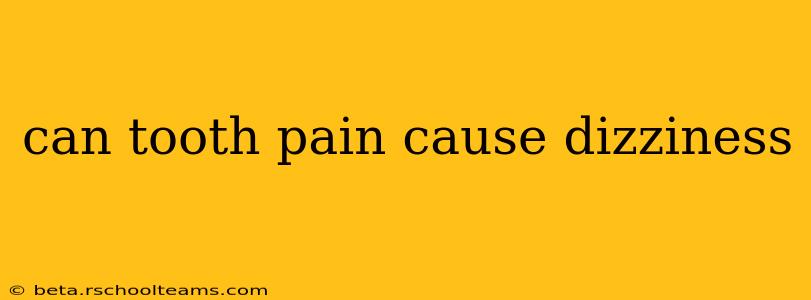Tooth pain, a common ailment, can sometimes be accompanied by unexpected symptoms like dizziness. While not directly related in a cause-and-effect way, the link between tooth pain and dizziness is more complex than it initially seems. This article explores the potential connections, offering insights into why you might experience both simultaneously.
What Causes Tooth Pain?
Understanding the root causes of tooth pain is crucial to understanding its potential link to dizziness. Common culprits include:
- Dental Cavities (Dental Caries): Bacteria erode tooth enamel, causing pain as the decay reaches the dentin and pulp.
- Gum Disease (Periodontitis): Infection and inflammation of the gums can lead to severe pain and even tooth loss.
- Abscessed Tooth: A serious infection at the root of a tooth, characterized by intense throbbing pain and swelling.
- Cracked Tooth: A fracture in the tooth's structure can cause sharp, sudden pain.
- Temporomandibular Joint (TMJ) Disorders: Problems with the jaw joint can radiate pain to the teeth and surrounding areas.
- Sinus Infections: Proximity of the sinuses to teeth can cause referred pain, making it difficult to discern the exact source.
How Might Tooth Pain Lead to Dizziness?
The connection between tooth pain and dizziness isn't direct, but several indirect factors can explain their simultaneous occurrence:
-
Pain and Stress Response: Intense tooth pain triggers the body's stress response, potentially leading to physiological changes such as increased heart rate, changes in blood pressure, and even fainting or dizziness. The body's release of adrenaline and cortisol can contribute to these symptoms.
-
Dehydration: Severe tooth pain may lead to reduced fluid intake due to discomfort or difficulty swallowing. Dehydration can cause dizziness and lightheadedness.
-
Medication Side Effects: Pain relievers, such as NSAIDs, can occasionally cause dizziness as a side effect.
-
Underlying Medical Conditions: In some cases, tooth pain might be a symptom of an underlying medical condition causing dizziness, such as an infection spreading to the bloodstream or a cardiovascular issue. This is less common but requires medical attention.
Can a Toothache Make You Feel Faint?
Yes, the intense pain associated with a severe toothache can trigger a vasovagal response. This reflex can cause a sudden drop in heart rate and blood pressure, resulting in feelings of faintness or even fainting. This is especially true in situations where the pain is unexpected or intense.
What if I Have Tooth Pain and Dizziness?
Experiencing both tooth pain and dizziness necessitates seeking professional medical advice. While it's unlikely that the tooth pain itself directly causes the dizziness, the combination warrants evaluation. A dentist can assess the oral health issues causing the pain, while a physician can rule out any underlying medical conditions contributing to dizziness. Do not self-diagnose or delay seeking professional help.
When to See a Doctor or Dentist
Consult a dentist or doctor immediately if you experience:
- Severe tooth pain that doesn't respond to over-the-counter pain relievers.
- Tooth pain accompanied by fever, swelling, or redness.
- Dizziness that is severe, prolonged, or accompanied by other symptoms.
- Fainting or loss of consciousness.
By understanding the potential connections between tooth pain and dizziness, you can better address any concerns and receive appropriate medical care. Remember, seeking professional help is crucial for accurate diagnosis and effective treatment.
